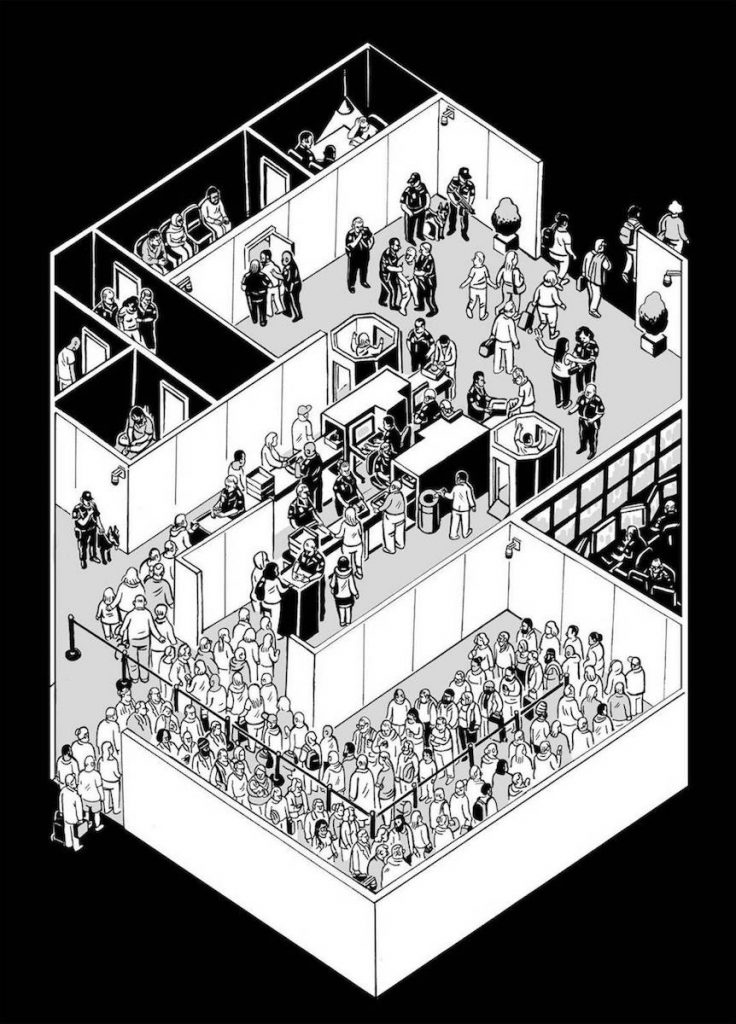A snow flurry swirls up from the lakeshore on a chilly Sunday afternoon. Outside the Canadian Opera Company’s Tanenbaum Centre where director Joel Ivany is rehearsing his latest startling, self-originated production, winter has hit. Shedding his jacket in his resident indie stage company’s office, Ivany’s customary brightness pales to more sombre shades of concern as he settles in to discuss Against the Grain Theatre’s much anticipated probe into the ever-darkening world of failed civil rights.
“It’s interesting,” notes Ivany, “from a social or even media perspective what people engage with. ‘I don’t know how I feel so I’m not going to say anything.’ Do we really connect with our friends, our colleagues on issues which are happening now? What we’ve found is it’s so incredibly overwhelming but so important.”
Adding a strong, articulate voice to a growing chorus of artistic activists, AtG lands today’s headlines squarely on the music theatre stage. Although defined by the limits of its quasi Orwellian setting— a brutal detention centre for the victims of state-sponsored prejudice and hate — Bound, the pioneering collective’s latest operatic venture, is less dystopian narrative than prophetic statement of advancing reality.
“What is our response in the arts when we are frustrated politically or socially?”, Ivany wonders aloud.
Seen as an unflinching declaration of purpose, Bound represents a bold, though not entirely unforeseen leap forward for the director’s restless band of innovators, a developing commitment to social engagement sparked by Against the Grain’s landmark Ayre in 2016. Loudly applauded by Toronto audiences and critics alike, composer/arranger Osvaldo Golijov’s haunting exploration of historic Jewish-Muslim-Christian cross cultural values electrified. Opening coincidentally on the eve of the worrisome U.S. presidential election, Ivany readily admits to feeling an urgent need to carry the message of human experience rendered universal forward.
At this point in the evolution of Ivany’s current project, Bound, a visceral, heartfelt plea for compassion presented in workshop form in the COC’s no-nonsense Hal Jackman Studio, the focus is on process rather than polished product. Creative development, libretto and score, has been an exercise in intense, far-reaching collaboration for both director and seven singer actor cast.
“The first five days, we didn’t sing a note. I gave them all one news article they could start with to build their character and then their homework was to find three more that spoke to them. Then from those articles and what we were talking about as a group, literally came the text.”
Music, based on arias by Handel, grew in similar organic fashion. Cast members were each asked to submit three selections that held particular meaning for them. Lyric profile, variety and drama —contemplative largos to explosive bravura solos — determined which pieces would ultimately prevail.
“From there, working with new dialogue on top of music, we’d all just try things and then the next day our artistic consultant, Kevin Lau, would show up with an amendment and we’d fit it in and try it.”
The question of why Handel poses no mystery for Ivany, an ardent admirer of the perpetually inventive London maestro.
“The music is simple but so utterly beautiful. Yes, it’s ornamental and technical and pretty but once you get down in there there’s a real breathing humanity.”
The congruency of purpose here is striking, an implied bond linking 18th century composer/impresario to present day writer/director uniting them across the centuries. An enduring respect for the individual, a drive to bring about change however discrete, nimble minds meet in Bound. Opera is reshaped.
“Handel is very malleable, very plasticky”, Ivany says of his muse. George Frideric, a genius at adaptation, might very well have been précising his own approach to moulding new work from pre-existing pieces.
Bound, however, is no Baroque pastiche. Although much indebted to Handel, this tense 60-minute profile of autocracy is very much a product of here and now. The past is past, the opera’s future deliberately placed in limbo, simultaneously circumscribed and unbounded as Ivany explains.
“The intention is, assuming that this has impact and worth, that we will spend another two years on it to maintain the focus and inclusivity. If it has the worth and the impact that we think it could, then we would fully orchestrate it for a small ensemble, spend more time fleshing out the characters and ideally share and say to our audience, ‘This is our community here in Toronto, you’re also part of it, follow along on this journey and we’ll try to open as many doors as we can.’”
Where Ivany and associates will lead us, indeed where Bound will ultimately lead Against the Grain is beyond imagining. There is likely only one firm conclusion to be drawn from the experience of witnessing a new opera in the making. The power of the piece resides in the moment.
* * *
Artwork: Infinity Checkpoint by Dmitry Bondarenko


